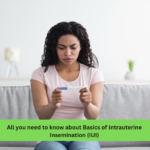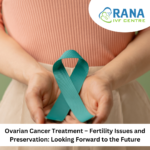COVID-19 and Fertility: Understanding the Impact at Rana Hospital
The COVID-19 pandemic has brought about significant changes in our world, affecting various aspects of life, including healthcare accessibility and the ability to conceive. With the emergence of new variants and their unique characteristics, concerns have arisen regarding the virus’s impact on fertility and reproductive health. In this article, we aim to address these concerns and dispel any misconceptions by reviewing the latest research and evidence on the relationship between COVID-19 and fertility, pregnancy, and reproductive health.

1. Direct Effect on Fertility
While COVID-19 primarily affects the respiratory system, there is no evidence suggesting a direct impact on fertility. The angiotensin-converting enzyme 2 (ACE2) receptor, which the virus commonly interacts with, is more prevalent in the respiratory tract than the reproductive system. Therefore, it is unlikely that COVID-19 directly affects male or female fertility.
2. Impact on Sperm Quality and Sexual Performance
Studies investigating the impact of influenza-like respiratory viruses on male fertility have shown transient effects on sperm quality and sexual function. However, there is currently no conclusive evidence that COVID-19 has a similar effect. It is important to note that any potential side effects on sperm parameters or sexual function usually resolve once the infection clears up.
3. Effects on Ovulation and the Menstrual Cycle
Although there is limited evidence linking COVID-19 to irregular menstrual cycles or ovulation, the overall strain caused by the pandemic can indirectly affect reproductive health. Stress, which is heightened during this time, can disrupt the regularity of ovulation and menstruation, leading to hormonal imbalances. Therefore, practicing effective stress management and seeking medical attention during significant disturbances is crucial.
COVID-19 During Pregnancy
1. Pregnancy Outcome
Recent research suggests that pregnant women are not at a higher risk of contracting COVID-19 compared to the general population. However, pregnant women with the virus are more likely to experience severe complications, particularly in the later stages. To ensure a safe pregnancy, it is essential for pregnant women to adhere to strict safety measures and seek immediate medical help if they develop symptoms of COVID-19.
2. Vertical Transmission
Vertical transmission refers to the spread of the virus from mother to fetus during pregnancy. While rare, cases of vertical transmission have been reported. However, most babies born to mothers with COVID-19 do not test positive for the virus. To minimize the risk of transmission, healthcare professionals take appropriate precautions during childbirth.
3. Preparation for Pregnancy and Reproductive Medicine
Reproductive medicine, such as in vitro fertilization (IVF) and other assisted reproductive technologies, initially faced disruptions during the pandemic due to clinic closures and limitations. However, healthcare providers have adapted to ensure the safe continuation of these procedures, prioritizing the well-being of patients.
Conclusion
Available data suggest that COVID-19 does not directly harm fertility, although there are still uncertainties regarding its effects on reproductive health. However, the stress and disruptions caused by the pandemic may indirectly impact fertility. It is crucial for healthcare professionals and individuals to stay updated with the latest research findings on COVID-19 and its implications for fertility and reproductive health as studies progress.





No Comments